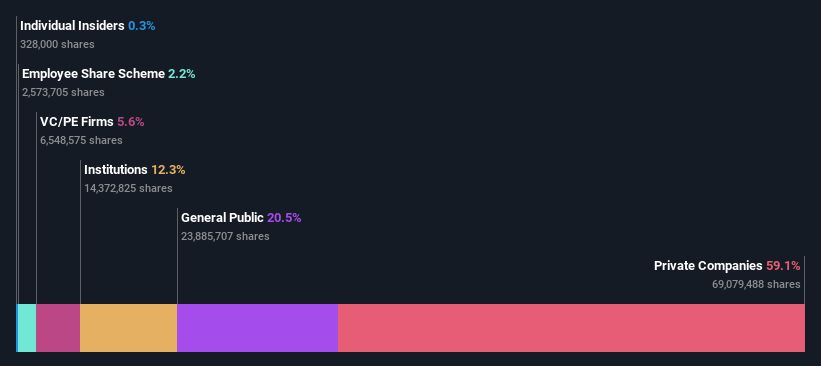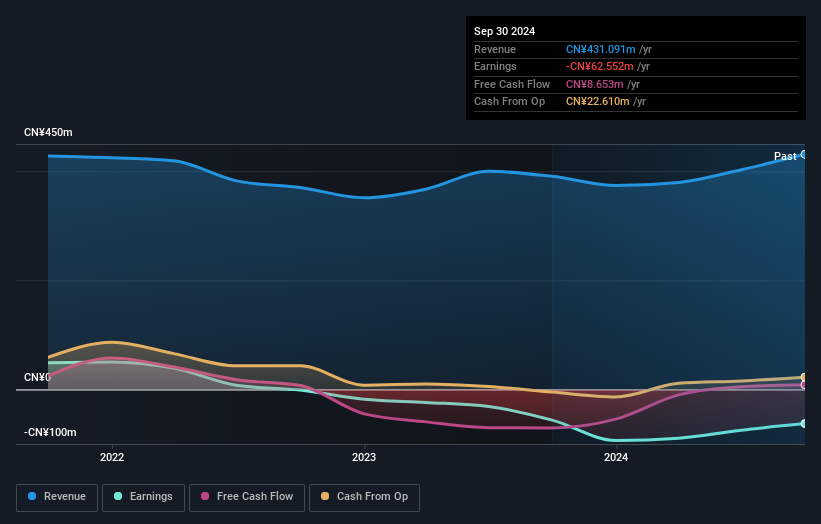- China
- /
- Professional Services
- /
- SZSE:301228
SEP Analytical (Shanghai) Co., Ltd.'s (SZSE:301228) largest shareholders are private companies who were rewarded as market cap surged CN¥272m last week
Key Insights
- SEP Analytical (Shanghai)'s significant private companies ownership suggests that the key decisions are influenced by shareholders from the larger public
- A total of 2 investors have a majority stake in the company with 52% ownership
- Institutional ownership in SEP Analytical (Shanghai) is 12%
To get a sense of who is truly in control of SEP Analytical (Shanghai) Co., Ltd. (SZSE:301228), it is important to understand the ownership structure of the business. And the group that holds the biggest piece of the pie are private companies with 59% ownership. That is, the group stands to benefit the most if the stock rises (or lose the most if there is a downturn).
As a result, private companies collectively scored the highest last week as the company hit CN¥1.9b market cap following a 17% gain in the stock.
Let's take a closer look to see what the different types of shareholders can tell us about SEP Analytical (Shanghai).
View our latest analysis for SEP Analytical (Shanghai)

What Does The Institutional Ownership Tell Us About SEP Analytical (Shanghai)?
Institutional investors commonly compare their own returns to the returns of a commonly followed index. So they generally do consider buying larger companies that are included in the relevant benchmark index.
We can see that SEP Analytical (Shanghai) does have institutional investors; and they hold a good portion of the company's stock. This can indicate that the company has a certain degree of credibility in the investment community. However, it is best to be wary of relying on the supposed validation that comes with institutional investors. They too, get it wrong sometimes. When multiple institutions own a stock, there's always a risk that they are in a 'crowded trade'. When such a trade goes wrong, multiple parties may compete to sell stock fast. This risk is higher in a company without a history of growth. You can see SEP Analytical (Shanghai)'s historic earnings and revenue below, but keep in mind there's always more to the story.

SEP Analytical (Shanghai) is not owned by hedge funds. The company's largest shareholder is Shipu (Shanghai) Enterprise Management Co., Ltd., with ownership of 45%. For context, the second largest shareholder holds about 7.4% of the shares outstanding, followed by an ownership of 5.6% by the third-largest shareholder.
To make our study more interesting, we found that the top 2 shareholders have a majority ownership in the company, meaning that they are powerful enough to influence the decisions of the company.
While studying institutional ownership for a company can add value to your research, it is also a good practice to research analyst recommendations to get a deeper understand of a stock's expected performance. Our information suggests that there isn't any analyst coverage of the stock, so it is probably little known.
Insider Ownership Of SEP Analytical (Shanghai)
The definition of an insider can differ slightly between different countries, but members of the board of directors always count. Company management run the business, but the CEO will answer to the board, even if he or she is a member of it.
Insider ownership is positive when it signals leadership are thinking like the true owners of the company. However, high insider ownership can also give immense power to a small group within the company. This can be negative in some circumstances.
Our most recent data indicates that insiders own less than 1% of SEP Analytical (Shanghai) Co., Ltd.. But they may have an indirect interest through a corporate structure that we haven't picked up on. It appears that the board holds about CN¥5.3m worth of stock. This compares to a market capitalization of CN¥1.9b. We generally like to see a board more invested. However it might be worth checking if those insiders have been buying.
General Public Ownership
The general public, who are usually individual investors, hold a 20% stake in SEP Analytical (Shanghai). While this size of ownership may not be enough to sway a policy decision in their favour, they can still make a collective impact on company policies.
Private Equity Ownership
With an ownership of 5.6%, private equity firms are in a position to play a role in shaping corporate strategy with a focus on value creation. Sometimes we see private equity stick around for the long term, but generally speaking they have a shorter investment horizon and -- as the name suggests -- don't invest in public companies much. After some time they may look to sell and redeploy capital elsewhere.
Private Company Ownership
It seems that Private Companies own 59%, of the SEP Analytical (Shanghai) stock. It's hard to draw any conclusions from this fact alone, so its worth looking into who owns those private companies. Sometimes insiders or other related parties have an interest in shares in a public company through a separate private company.
Next Steps:
I find it very interesting to look at who exactly owns a company. But to truly gain insight, we need to consider other information, too. For instance, we've identified 1 warning sign for SEP Analytical (Shanghai) that you should be aware of.
Of course this may not be the best stock to buy. Therefore, you may wish to see our free collection of interesting prospects boasting favorable financials.
NB: Figures in this article are calculated using data from the last twelve months, which refer to the 12-month period ending on the last date of the month the financial statement is dated. This may not be consistent with full year annual report figures.
New: Manage All Your Stock Portfolios in One Place
We've created the ultimate portfolio companion for stock investors, and it's free.
• Connect an unlimited number of Portfolios and see your total in one currency
• Be alerted to new Warning Signs or Risks via email or mobile
• Track the Fair Value of your stocks
Have feedback on this article? Concerned about the content? Get in touch with us directly. Alternatively, email editorial-team (at) simplywallst.com.
This article by Simply Wall St is general in nature. We provide commentary based on historical data and analyst forecasts only using an unbiased methodology and our articles are not intended to be financial advice. It does not constitute a recommendation to buy or sell any stock, and does not take account of your objectives, or your financial situation. We aim to bring you long-term focused analysis driven by fundamental data. Note that our analysis may not factor in the latest price-sensitive company announcements or qualitative material. Simply Wall St has no position in any stocks mentioned.
About SZSE:301228
SEP Analytical (Shanghai)
Engages in the provision of third-party testing services in China.
Flawless balance sheet with very low risk.
Market Insights
Community Narratives




